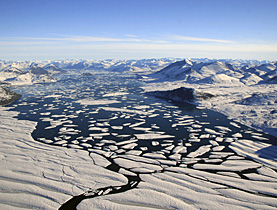Experts link climate change and human rights

Climate negotiators in Copenhagen must not only reduce greenhouse gases but also ensure full citizen participation in the final deal, says the Swiss foreign minister.
Micheline Calmy-Rey made the remark on Monday at a Geneva conference on links between climate change and human rights, and their integration into the crucial United Nations Climate Conference negotiations in the Danish capital in December.
By directly affecting people’s living conditions, global warming has direct consequences on human rights, the foreign minister commented.
“Climate change is a specific threat to the right to food, housing and drinking water for millions of individuals,” she told the 200-strong audience at the Seventh Gathering for Human Rights in Geneva on Monday.
And at least 50 million people will be displaced by climate change-related phenomena by 2050, she added.
The foreign minister’s comments concurred with a report published in March 2009 by the UN Office for the High Commissioner for Human Rights, which concluded that “there is a broad agreement that climate change has generally negative effects on the realization of human rights.”
Broader debate
Over the past couple of years the climate change debate, which has traditionally focused on scientific, environmental and economic aspects, has progressively broadened to include human and social dimensions.
The number of reports and studies addressing this link continues to rise and two resolutions on human rights and climate change at the Geneva-based UN Human Rights Council in March 2008 and March 2009 are examples of this trend.
“Switzerland doesn’t think the council is the place to resolve such issues, but it throws new light on the protection aspect,” said Muriel Berset, a human rights official with the Swiss Mission in Geneva.
The current draft for the Copenhagen negotiations contains part of the March 2009 resolution, which is a “good start” and provides “areas to explore”, Berset said.
“Copenhagen is taking decisions about the future of our world and such decisions need to be taken in a human rights framework,” said Kyung-wha Kang, deputy UN high commissioner for human rights.
Kang described the inclusion of the resolution as a “new perspective”, but warned “failure to take action would be inexcusable”.
“Protecting the individual against climate change should be the ultimate goal,” she told the audience.
During the morning a panel of human rights specialists examined whether existing legal human rights standards and principles responded adequately to cope with climate change.
Most, like Daniel Bolomey, secretary-general of Amnesty International Switzerland, felt existing instruments were “applicable”.
But Yves Lador, the Geneva representative of Earthjustice, said there was a need to partly redefine the human rights protection system.
“The costume is too small and is starting to split,” he noted.
“Not an all-or-nothing conference”
In her speech Calmy-Rey said it was crucial the poorest and most-vulnerable are listened to in Copenhagen.
“It is essential from a human rights perspective that the Copenhagen accord not only ensures the reduction of dangerous greenhouse gas emissions, but also guarantees the participation of citizens in the formulation and application of national measures resulting from the climate pact,” she said.
Yves Lador, the Geneva representative of environment law defender Earthjustice, agreed that for Copenhagen to be a success “a major step” was needed to include human rights and to develop “real participative mechanisms”.
“But although Copenhagen is a crucial moment, it’s not an all-or-nothing conference,” he said. “We have to look what comes afterwards and the follow-up.”
The Human Rights Council is due to take up the issue again in March 2010, which will offer an opportunity to monitor the implementation of the Copenhagen accord, the level of participation and its impact, he commented.
“If there is no mechanism to follow up the human rights impact of Copenhagen, it will all be a waste of time,” said Lador.
Geneva will also play a very important role in the future, he added.
“Much of the information for the Copenhagen talks originates from the World Meteorological Organization, the Secretariat of the Intergovernmental Panel of Climate Change and the UN Special Rapporteur system, all based in Geneva,” said Lador.
“It will be an occasion for us to renew the Geneva spirit to allow information to be exchanged; Geneva will be the place for meetings and solutions resulting from Copenhagen.”
Simon Bradley in Geneva, swissinfo.ch
Kyoto, a 178-nation accord, is a 1997 annex to the 1992 UN climate treaty that requires 37 industrial nations to reduce greenhouse gas emissions by an average of 5% below 1990 levels by 2010.
The Swiss parliament ratified the Kyoto Protocol on climate change in 2003. Switzerland undertook to reduce its CO2 emissions to 10% less than 1990 levels by 2010.
Despite ambitious emission targets, greenhouse gas emissions have actually risen by 0.4% in Switzerland since 1990.
A CO2 law came into force in 2000 to ensure that the Kyoto target was achieved. About a thousand enterprises have taken voluntary measures to reduce their emissions.
But it became clear by 2005 that these measures were not sufficient. It is proving difficult, however, to agree on how to strengthen them.
December’s UN Climate Conference in Copenhagen will decide on emission reduction measures to replace those agreed in Kyoto in 1997 which expire in 2013.
The UN-led negotiations are currently bogged down over arguments about rich nations’ targets to cut emissions by 2020, financing for poorer nations to adapt to climate change and to curb their own greenhouse gas emissions, and the best way to deliver and manage those funds.

In compliance with the JTI standards
More: SWI swissinfo.ch certified by the Journalism Trust Initiative














You can find an overview of ongoing debates with our journalists here . Please join us!
If you want to start a conversation about a topic raised in this article or want to report factual errors, email us at english@swissinfo.ch.